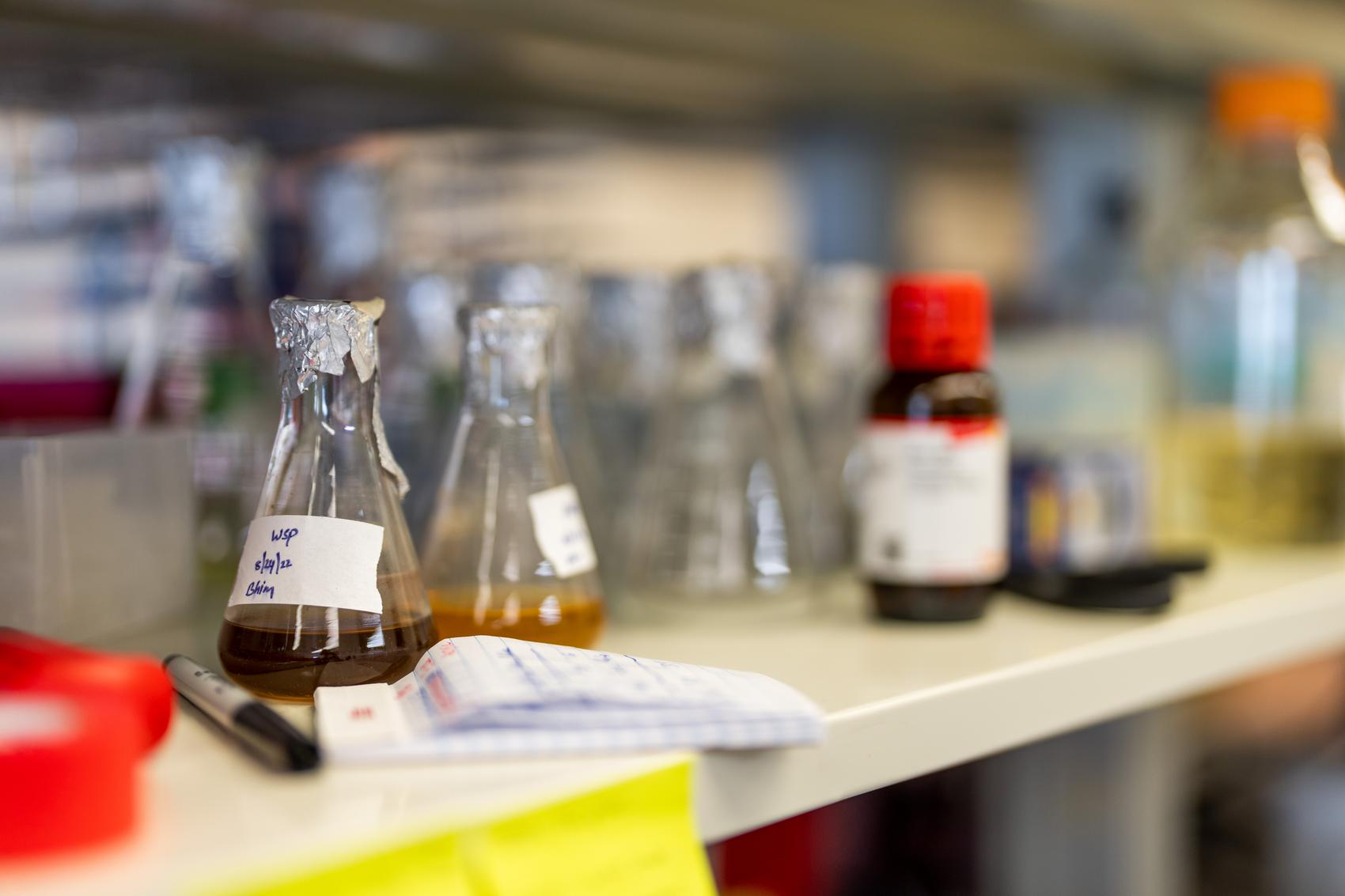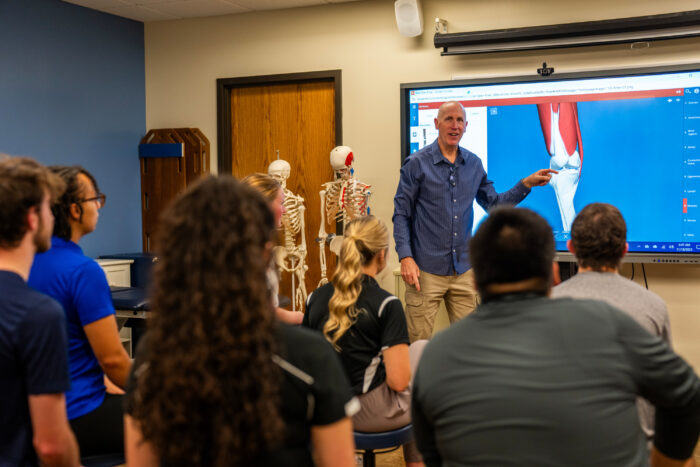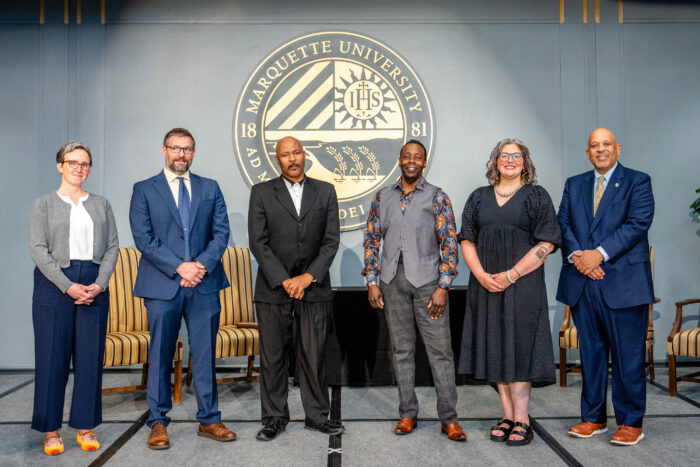 Marquette University’s Office of Research and Sponsored Programs has announced the following research grants awarded to university faculty and staff in June/July 2022.
Marquette University’s Office of Research and Sponsored Programs has announced the following research grants awarded to university faculty and staff in June/July 2022.
- Marquette University biomedical sciences professor receives $1.8M grant to study sex differences in brain mechanisms of seasonality (Dr. Jennifer Evans)
- Marquette engineering professor receives $4.2 million Department of Energy grant for methane-reduction technology (Dr. Adam Dempsey)
- Marquette School of Dentistry researcher receives $1.45M NIH grant to study effects of aging on oral health (Dr. Mariana Reis)
- Marquette University biological sciences professor receives NSF grant to study behavioral and physiological reactions to climate fluctuations (Dr. Chelsea Cook)
- Marquette University chemistry professor receives $1.8 million grant to modernize processes in medicine synthesis (Dr. Joseph Clark)
4 Schools Mental Health Initiative
$90,000 – The Boule Foundation
- Patrick Kennelly (PI), director of the Center for Peacemaking; Gabriel Velez, assistant professor of educational policy and leadership in the College of Education; and Dr. Lucas Torres, professor of psychology in the Klingler College of Arts and Sciences
- Abstract: This initiative is a family-centered program designed to support students struggling with mental health, academic, and/or behavioral challenges. “4 Schools” is a multisector partnership which addresses mental health concerns the Boule Foundation has identified in the June study and is focused on delivering results. This initiative improves social-emotional outcomes and restores relationships by providing strategies that better equip students to become resilient learners while simultaneously building school and family partnerships.
Addressing learned non-use during early recovery from stroke
$427,951 – National Institutes of Health
- Robert Scheidt (PI), professor, and Dr. Leigh Mrotek Gorzek, research professor, in the Marquette and Medical College of Wisconsin Joint Department of Biomedical Engineering
- Abstract: This project evaluates custom wearable technology and associated procedures designed to address learned non-use of the more involved upper extremity by increasing the amount of therapeutic exercise during the earliest stages of recovery from stroke.
Capturing the Impact of Real, Complex Biomass Char Particle Morphology during Gasification
$275,112 – National Science Foundation
- Simcha Singer, assistant professor of mechanical engineering in the Opus College of Engineering
- Abstract: This research will study gasification of biomass particles from several feedstocks using three-dimensional imaging and simulations to generate fundamental knowledge and modeling capabilities for the impact of real porous biomass structures. This will help to advance clean bioenergy technologies that reduce pollution, mitigate environmental damage and increase efficiency.
Exercise as Treatment in Children with Communication Impairments
$403,323 – National Institutes of Health
- Jenya Iuzzini-Seigel (PI), assistant professor of speech pathology and audiology, Dr. Sandra Hunter, professor of exercise science, and Michael Danduran, clinical associate professor of exercise science; in the College of Health Sciences; and Dr. Naveen Bansal, professor of mathematical and statistical sciences in the Klingler College of Arts and Sciences
- Abstract: This research tests the effects of exercise treatment on cognitive-linguistic and physical outcomes in children with language disorders, holding significant promise for maximizing treatment outcomes and quality of life for children with communication impairments and their families.
Addressing the clinical feasibility of peripheral optogenetic strategies for spinal cord injury rehabilitation
$125,000 – Northwestern University (National Institutes of Health)
- Jordan Williams, assistant professor in the Marquette and Medical College of Wisconsin Joint Department of Biomedical Engineering
- Abstract: Peripheral optogenetic stimulation of muscle activity presents many attractive benefits over current functional electrical stimulation approaches to reversing paralysis in spinal cord injury, but several hurdles must be addressed before advancing this technology to clinical reality. These studies will first and foremost establish the efficacy of viral optogenetic therapy for spinal cord injury using intramuscular virus injections in a rodent model. In addition, these studies will examine the scalability of current optogenetic methods to large animal models with an eye toward human translation. While clinical realization of this relatively young peripheral optogenetic therapy for spinal cord injury rehabilitation may remain decades away yet, the aims of this project represent critical steps toward that goal.
Collaborative Research: Structure, Dynamics, and Reaction Mechanism of Supported Single Atom for Photocatalytic CO2 Reduction
$299,245 – National Science Foundation
- Jier Huang, Wehr Distinguished Professor of Chemistry in the Klingler College of Arts and Sciences
- Abstract: This research will contribute to the development of PS/SAs photocatalytic system to reduce CO2 to generate renewable carbon-based fuels or chemical feedstocks, with the broader goal of addressing the energy crisis and climate issues. In addition, the experimental approaches employed in this research will create a structural model for future studies of real-time structure-function correlations for other photoactive materials, impacting broadly on fields such as photocatalysis, optoelectronic devices and solar energy conversion technologies.
Collaborative Research: Novel Plasma Physics of Trapped Antimatter
$233,365 – National Science Foundation
- Tim Tharp, associate professor of physics in the Klingler College of Arts and Sciences
- Abstract: Results of this project are expected to advance both plasma physics and particle physics through improved understanding of antimatter traps. This award will support graduate and undergraduate student researchers, which contributes to training the next generation of the STEM workforce and helps fulfill a pressing societal need.
AnMBR for Sustainable Wastewater Management
$50,000 – National Science Foundation
- Daniel Zitomer (PI), chair and professor, and Antonio Carlos De Oliveira Martins, graduate assistant, in the Department of Civil, Construction and Environmental Engineering in the Opus College of Engineering
- Abstract: The project will advance more sustainable used water recovery and energy conservation to meet local and global social and economic sustainability goals. The biogas generated from large wastewater treatment plants using the anaerobic membrane bioreactor (AnMBR) can be used in buildings or as bio-compressed natural gas for vehicle fuel to meet cellulosic transportation fuel goals. Project results may contribute to the development of other AnMBR applications, such as for industrial wastewater treatment.
Bringing Post-Quantum Cryptography to Large-Scale NextG Systems
$249,772 – Florida Atlantic University (National Science Foundation)
- Mumin Cebe, assistant professor of computer science in the Klingler College of Arts and Sciences
- Abstract: The goal of this research is to develop, design, analyze and deploy quantum-safe protocols based on NIST recommendations for post-quantum cryptography and integrate them with the upcoming NextG infrastructure by developing an efficient and secure key management scheme.



